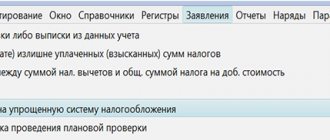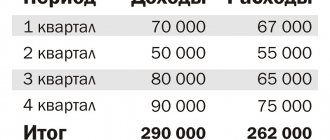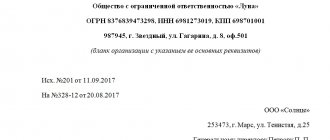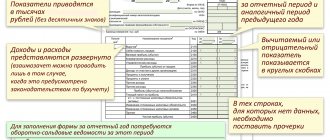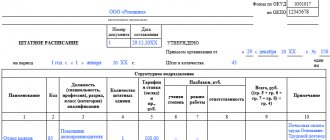Allocation of VAT by calculation
As a general rule, the contract price is determined taking into account VAT. If the tax amount is allocated separately in the contract, then it is the seller who will present it to the buyer (clauses 1, 4, article 168 of the Tax Code of the Russian Federation).
If the amount of VAT is not allocated in the contract, then the seller must independently, by calculation, allocate the VAT from the contract price and present it to the buyer (clause 1 of Article 168, clause 1 of Article 173 of the Tax Code of the Russian Federation). This rule corresponds to the resolution of the Plenum of the Supreme Arbitration Court dated May 30, 2014 No. 33, in paragraph 17 of which the following is established: if the VAT amount is not allocated in the contract, then by default it is included in the contract price.
This rule does not apply to cases where, under the terms of the contract, VAT is not included in the price of goods, works, or services.
If the amount of VAT is not allocated in the contract, but the contract does not indicate that the tax is not included in the price, then such an agreement does not provide for the buyer’s obligation to pay the seller VAT in addition to the contract price. Therefore, the seller must extract VAT from the contract price when issuing an invoice. To do this, the amount specified in the contract must be multiplied by 20/120 or 10/110 - depending on the tax rate at which the goods, works, services sold, and transferred property rights are taxed (clause 4 of Article 164 of the Tax Code of the Russian Federation).
Example 1
According to the purchase and sale agreement for the refrigerator, its cost is 24,000 rubles. The amount of VAT is not allocated in the contract, but the contract does not indicate that the cost of the refrigerator does not include VAT. The contract does not contain any conditions for paying VAT in addition to the price of the refrigerator. Since this sale is subject to VAT at a rate of 20%, the seller will calculate the tax as follows:
24,000 rub. × 20/120 = 4,000 rub.
When issuing an invoice, the seller will include the following information:
- the cost of the refrigerator excluding VAT is 20,000 rubles;
- VAT amount – 4,000 rubles;
- the cost of the refrigerator including VAT is 24,000 rubles.
VAT regulations in the contract
Indication of VAT in an agreement or contract is a controversial issue that is resolved taking into account the taxation regime of the organization, as well as the contents of the contract. There are several regulations that regulate the procedure for calculating and disbursing payments to the budget, as well as some nuances of the activities of organizations.
The Tax Code of the Russian Federation, part one, regulates relations regarding the establishment, introduction and collection of taxes in the country. The Civil Code of the Russian Federation contains legal aspects of LLC activities. The Labor Code of the Russian Federation establishes procedures and rules for the movement of goods across the border of the Russian Federation.
Federal Law No. 129 contains data on the specifics of registering legal entities and individual entrepreneurs. The law regulates the relations that arose in connection with the registration, as well as changes to the constituent documents, etc.
Decree of the Government of the Russian Federation No. 914 defines the procedure for buyers and sellers of goods, establishes the specifics of filling out accounting journals, accounts, purchase books, etc. by VAT payers. The letter of the Federal Tax Service of the Russian Federation dated February 24, 2010 clarifies aspects related to the codification of transactions subject to payment.
The letter from the Federal Tax Service dated 02/04/2010 clarifies the need to issue invoices for advance payments.
Statement of Circumstances
Probably, everyone who has come across foreign trade contracts has read entire sections about statements and guarantees in such contracts, where everything is provided for all occasions.
Representations and warranties are statements of fact made at a specific point in time and addressed by one party to the other. Their goal is to record facts that are important for future participants in the transaction. On June 1, 2015, Art. 431.2 of the Civil Code of the Russian Federation. According to this rule, a party to a contract that has given the other party unreliable assurances about the circumstances is obliged to compensate the other party, at its request, for losses caused by the unreliability of such representations, or to pay a penalty provided for in the contract.
Representations about the circumstances must be drawn up in writing; they can be included in the contract, for example, in the other conditions section, or they can be drawn up in the form of an additional agreement to the contract, or included in a settlement agreement in a legal dispute.
What assurances about the circumstances do we recommend including in the contract?
1. Your counterparty is a duly registered legal entity or individual entrepreneur.
It would seem that if your counterparty enters into an agreement, then, of course, it has passed state registration. But no, those who participated in litigation regarding unscrupulous suppliers have probably encountered a situation where an agreement was concluded on a certain date, and the counterparty was registered several days or even months after the conclusion of the agreement. And this “unfortunate mistake” can be very expensive.
2. The supplier’s executive body is located and performs management functions at the location of the legal entity or individual entrepreneur.
This assurance protects against unreliable data in the Unified State Register of Legal Entities, Unified State Register of Individual Entrepreneurs, as well as against claims regarding the mass availability of the address.
3. The person who signed the agreement has the authority to sign it.
This clause may be useful if the agreement was signed by a disqualified director, or the person who signed the agreement has “lost his memory” and refuses to sign, or the agreement was signed by proxy, and you were not provided with a copy.
4. To conclude the execution of the contract, the supplier has received all necessary consents, permits, and approvals in accordance with current legislation. There are no restrictions prohibiting the supplier from entering into or performing the contract.
This paragraph concerns licenses, participation in SROs and other necessary procedures for fulfilling the contract.
5. The supplier has the right to carry out the type of economic activity provided for in the contract.
OKVEDs exist for the purpose of choosing them in accordance with your activities, but this is not the case for everyone: either this is a non-standard operation for your supplier, or the supplier began to carry out other types of activities, but did not make the corresponding changes to the Unified State Register of Legal Entities. But this is monitored quite closely by both banks and tax authorities.
6. The supplier pays all taxes and fees in accordance with the legislation of the Russian Federation, and submits tax reporting in a timely and complete manner.
As a rule, problems for a taxpayer arise when, as tax authorities say, “there is no source for paying VAT to the budget,” that is, someone in the chain has not paid the tax.
7. Each operation of the seller to purchase goods from suppliers, sell goods to the Buyer is fully reflected in the primary documentation, accounting, statistical and other reporting.
The supplier undertakes to report the VAT paid by the buyer as part of the price of the goods and provide the buyer with primary documents that fully comply with the legislation of the Russian Federation (including TORG-12 delivery notes, or UPD, invoices, technical specifications, specifications, acts, etc.)
Quite often there are situations where the supplier issued an invoice to the buyer, but did not reflect it in his reporting; this clause will help shift the financial responsibility for such dishonest actions to the supplier.
8. The goods supplied under the contract belong to the supplier by right of ownership.
It is assumed that the goods that the supplier supplies are his property, but nevertheless, there are many legal structures that allow you to sell goods that are not your own (commission agreement, orders, agency agreement) and if this is the case, these facts must be indicated in the contract. Therefore, the assurance that the goods belong to the supplier will not be superfluous.
9. The supplier is obliged, upon the first request of the tax authorities or the buyer (counter check), to provide certified copies of documents confirming guarantees and assurances within 5 business days from the date of receipt of the request from the tax authority or buyer.
In practice, there are quite often situations when your counterparty has submitted documents following a counter-inspection, but since, on behalf of your inspection, the counterparty’s inspection is requesting documents from the counterparty, it is possible that the documents will arrive at your tax authority after the end of the desk audit period, and in In the act, the inspector will rightfully reflect the argument that the documents for the counter-inspection have not been submitted.
Then you need to provide your tax authority with evidence that the documents were sent by your counterparty.
If the contract contains assurances about the circumstances, the supplier is obliged to compensate the buyer for losses caused by the supplier’s violation of the guarantees and assurances specified in the contract and/or violations of tax legislation committed by him, which were reflected in the decisions of the tax authorities in the amount that the buyer had to pay to the budget for decisions (requirements) of tax authorities on additional assessment of VAT, income tax, penalties, fines (including decisions on refusal to apply tax deductions), which was paid to the supplier as part of the price of the goods.
The supplier is obliged to compensate the buyer for losses incurred due to his fault (including additional VAT, income tax, fines, penalties, etc.) within five days from the date of receipt of the buyer’s demand.
Using precisely these formulations, Trading House Reef LLC recovered more than 12 million rubles from its supplier Agribusiness LLC. due to the fact that he created an artificial document flow with his supplier Favorit LLC in the absence of the actual opportunity to supply goods and materials (Case No. A53-22858/2016). The court proceeded from the following: the current legislation does not exclude the possibility of qualifying as losses the amounts of taxes and fees paid due to the fault of another person who did not fulfill the assurance of the circumstances, if there is a direct cause-and-effect relationship between his actions and the resulting consequences.
Assurances about the circumstances are like a litmus test: it can reveal the true intentions of your counterparty. If the counterparty has nothing to hide, is registered in accordance with current legislation, independently fulfills its obligations under the transaction, has labor and technical resources and reflects its transactions in tax reporting, then it will not resist signing an agreement with assurances about the circumstances included in it.
But if everything is wrong, then this may serve as a reason for refusing to conclude an agreement on such terms. Thus, the refusal to provide guarantees and representations raises doubts about the good faith of the party to the contract.
Forms of VAT documents in the contract
When concluding a contract, an important parameter is the cost of goods or services. However, after agreeing on the cost, it is important to take into account the amount of VAT on top. An incorrectly drafted VAT agreement can lead to problems with the Federal Tax Service.
According to the Tax Code, sellers must indicate VAT in invoices, but there is no specific data on filling out the contract. It is noted that the agreement should also indicate the amount of tax so that the payer can avoid problems with the fiscal authorities.
If the contract does not specify the amount of the fee, the question becomes whether the contract price includes the amount of tax. If there is language confirming that the tax was not taken into account, there will be no problem. The buyer pays the amount in the contract and additionally tax. Lack of tax information can lead to conflicts between parties to a transaction. In this case, the courts more often side with the buyers.
There may be a problem with mentioning tax if the sale is not subject to this payment. This situation arises if the user applies a special regime or receives the right not to pay a fee in accordance with Article 145 of the Tax Code. In such cases, it is necessary to write “excluding VAT”. If an agreement has been concluded, the subject of which is not subject to payment, then next to the price you should indicate “VAT not subject to.”
Recommendations for drafting contracts
When concluding a contract, the conditions regarding the inclusion or non-inclusion of the VAT amount in the contract price should be clearly formulated at the stage of preparing its draft. This will allow you to avoid future misunderstandings in relations with the counterparty and claims from inspectors.
Practice shows that buyers do not always transfer additional VAT to sellers if, according to the terms of the contract, the price does not include the amount of VAT. But the buyer’s failure to pay VAT does not affect the seller’s obligation to pay tax to the budget. This means that the seller will have to pay the tax from his own funds.
Safe formulation
According to the rules, when the existing VAT rate changes, the amount specified in the contract must be recalculated before the new amount is specified in the contract. In this case, the buyer must subsequently agree to the new wording and sign a new contract.
In reality, this almost never happens. Negotiating a change in the contract amount is often difficult and the buyer may not agree to it. There are still disputes between lawyers about who will be right - the seller or the buyer.
To avoid conflicts, you can divide the amount for goods and VAT in the contract. That is, indicate the cost excluding tax. It is separately stated that the buyer must pay the rate that will be in effect at the time of depositing funds.
Options for contractual terms
Options for contractual terms
The conclusion of an agreement between a supplier and a buyer must take into account many factors. First of all, the tax system used is taken into account.
You also need to take into account the specifics of accounting and tax accounting and the rules for paying VAT. The fulfillment of contractual obligations also depends on whether this tax is included in the terms of the contract. There are 3 options here:
- VAT is clearly reflected in the terms of the contract. Its amount is indicated separately. In this case, both counterparties are on a common system. The parties to the agreement are familiar with the terms of purchase and sale, the need to pay and transfer VAT to the budget. Therefore, the buyer is aware of his obligation to transfer the amount of tax to the supplier and will fulfill it.
- One of the counterparties is an entrepreneur operating under a simplified tax system or another special regime. Such situations also do not cause difficulties; there is no subject for dispute here. The contract must indicate that one of the parties works on a special regime, therefore there is no need to indicate VAT. This point of view is typical for the Ministry of Finance. It expressed it in its letter back in 2016.
- One of the parties to the transaction is entitled to tax benefits. This applies to situations where an entrepreneur is exempt from paying tax, or it is a transaction that is not subject to taxation. The legal consequences in this case are identical to the previous option. The contract must contain a mention of the benefit that one of the parties has.
It will not be superfluous if the other party requests from the counterparty documentary evidence of the right to preferential taxation. These may be registration, charter or other documents. In such cases, the parties often omit mention of VAT altogether when concluding contracts.
Is it mandatory or not to indicate VAT in the contract?
A frequent cause of dispute between counterparties is the question of whether it is necessary to indicate the VAT rate in the contract. According to some reports, the amount of tax that is presented to the buyer when selling products should be taken into account when calculating the final price. The answer to the question whether it is necessary to highlight it in the accounting documents in the contract is affirmative.
Most forms of primary documents have special fields for highlighting tax. However, there are some documents that do not have a unified form, for example, an agreement. The allocation of tax may not be mandatory when selling goods to organizations that apply a special regime, or if services or products are exempt from taxation upon sale.
Tax clause in a contract - what is it?
To present approximate wording of tax clauses, let’s first understand the term itself.
A tax clause is the terms of a civil contract that determine the procedure for paying taxes and fees by the parties, as well as other related conditions. The clause discloses the procedure, rights and obligations of the parties regarding the payment of taxes that arise during the transaction.
The main requirement for a tax clause: it must not contradict the norms of the current Russian legislation, both federal, regional or local. If the text of the agreement contains conditions that run counter to the provisions of, for example, the Tax Code, then such conditions are considered void and do not carry any legal consequences.
Please note that tax clauses may appear in an agreement concluded not only between Russian partners. They are also typical for international contracts. Then the parties must take into account the provisions of the legislative acts of all countries of which the parties to the contractual relationship are residents, as well as agreements on the avoidance of double taxation that currently exist.
Experts from the reference and legal system “ConsultantPlus” examined the legality of including a tax clause in the text of the agreement in a special consultation. To view it, sign up for a free trial access to the system.
An error when specifying VAT in a contract may result in additional tax charges.
In some cases, when drawing up an agreement, companies mistakenly forget to indicate the added tax amount, or indicate the wrong rate, or incorrectly calculate the amount to be paid by the buyer. For example, a preferential rate may be applied unreasonably, or, conversely, the basic tariff may be applied by mistake.
According to existing legislation, the payment amount can be changed with the consent of the counterparty. Independent changes in price are permitted only by mutual and voluntary agreement of the parties. If the rate in the contract is incorrect, there is a risk that the VAT invoice will also be incorrect and the buyer will not be able to obtain a deduction.
Is it possible not to include a tax clause in the text of the contract?
The presence of a tax clause is not mandatory; the parties themselves determine its necessity in the agreement. Although, in one form or another, a tax clause will still be present in the text.
Particular attention should be paid to clauses regarding compensation by one party to the contract for tax losses associated with failure to fulfill obligations under the contract or non-compliance with the requirements of legislative acts. This primarily concerns VAT. In practice, situations often arise when, regardless of the wording, such clauses do not work and unscrupulous partners refuse to compensate for the tax losses of their counterparties. It must be admitted that the courts do not always support the injured party, even with a special clause. Therefore, you do not need to completely rely on the partner’s honesty and his signature in the contract. If possible, it is better to check the integrity of the counterparty yourself, using legal methods, so as not to have to bite your elbows later, for example, due to a failed tax deduction.
Conditions that will not allow the seller to revise the contract price in terms of VAT after the transaction is completed
Often a dispute arises between counterparties regarding the amount of the rate paid, if at the time of conclusion the rate was 18%, and later became 20%. According to the laws, the amount of the applied rate does not depend on the date of signing the contract. The new rate applies to goods and work that were shipped or completed starting from January 1, 2019.
The relevant question is whether there is a need to conclude additional agreements to existing contacts. This depends on the terms of the contract with the counterparty. There is no need to make changes if a condition has been agreed upon to unilaterally increase the price when the tax rate changes.
In addition, amendments are not made if the price is agreed upon in separate agreements, the contract specifies the size of the price and the wording “excluding VAT”. In this case, tax is charged on the excess cost of goods or work.
If VAT is not indicated in the contract, what will be the consequences?
When the “VAT” column of the agreement is empty, the buyer is primarily at risk. After paying the cost of the goods, the seller may make a claim against him for the need to pay VAT above the specified price. Therefore, it is better to protect yourself and discuss this issue at the stage of signing the contract.
As practice shows, most courts place responsibility in such situations on the seller, since it is his direct responsibility to present the tax to the buyer. Thus, the absence of a tax amount in the contract is an indication that the price includes “including VAT.” The buyer must calculate it based on the applicable rate: 20/120 or 10/110 (Article 164 of the Tax Code of the Russian Federation).
How to draw up an agreement without VAT and add tax on top
You can avoid mentioning a specific VAT rate in the contract, limiting yourself to referring to the norms of the Tax Code of the Russian Federation, which stipulate the rates, i.e. to clause 3 of Art. 164 Tax Code of the Russian Federation. Then the text of the additional agreement will look like this: “State clause 6.2 of the supply agreement in the following wording: the price of the goods for shipment is 120 thousand rubles, including VAT at the rate established by clause 3 of Art. 164 of the Tax Code of the Russian Federation."
Another possible way to edit a rolling contract: the parties stipulate in the additional agreement to the contract that the price there is indicated without VAT at all, and the amount of tax is added to the price additionally in accordance with the current rates.
So, how to fix the cost of goods without VAT in the contract? In this case, in the additional agreement to the contract, the signatories will indicate the following wording: “The price of the goods is 170 thousand rubles. excluding VAT. Value added tax is added to the cost of the goods additionally at the rates provided for in the current edition of clause 3 of Art. 164 Tax Code of the Russian Federation:
- 18% for those shipped no later than December 31, 2018;
- 20% if shipment occurred after 01/01/2019.”
How to calculate VAT using an online calculator?
The tax calculations themselves are not difficult. The only thing that can complicate them is the quantity.
All of the above formulas for calculating VAT can be used if you do not have a special calculator for calculating VAT at hand.
Our website provides an online calculator for calculating VAT - see the material “Calculating VAT calculator online”.
Thanks to the calculator, it is possible to simplify VAT calculations as much as possible. To do this, enter the amount of the cost of the product into the program window, and then indicate the tax rate. By clicking the “Calculate VAT” button, you can find the cost of the product including VAT. The “Select VAT” button allows you to find out the VAT from the entered amount. By clicking on the “Amount” button, you can determine by the VAT value:
Using a calculator allows you to avoid possible errors when manually calculating VAT.
You may also find a calculator useful for calculating premiums - see the material “Online calculator of insurance premiums and penalties for them.”
Source
What are transferable contracts and VAT on them?
For 15 years, Russia had a standard VAT rate of 18%.
However, in 2022, the legislator revised it and raised it to the level of 20%. Law No. 303-FZ dated 08/03/2018 provides that the new rate comes into force on 01/01/2019. This means that the seller must charge VAT at 20% on all shipments of goods (services provided, work, etc.) that he made to the buyer after this date, as well as on all advances received against future shipments. At the same time, the calculated tax rate will also change: instead of 18/118, 20/120 will be applied.
Important! At the same time, preferential tax rates remained. In particular, 10% continues to apply to transactions for the supply of food, children's and medical goods, periodicals and transportation services referred to in clause 2 of Art. 164 Tax Code of the Russian Federation.
However, Law No. 303-FZ does not explain how to carry out taxation in relation to supply contracts that are long-term in nature and therefore transfer from the previous taxation system of 18% to the new one of 20%. In other words, these are contracts that were concluded before the VAT increase, and must be executed after. Therefore, the issue of calculating VAT from 2022 under a transition agreement is today of interest to a wide range of subjects.
In such agreements, the parties could prescribe the mechanism for calculating VAT both “from above” (for example, “the price is 200 thousand rubles + VAT”), and indicating its specific size (the price is 354 thousand rubles, incl. VAT (18%) 54 thousand rubles). Therefore, it is important for companies to know how to correctly switch to paying 20% VAT in order to eliminate possible disputes with inspectors.
And here the question arises: how to specify a change in the VAT rate in the contract?
Peculiarities of VAT taxation of transferable contracts
To answer the question of how to register VAT in a transitional contract, it is important for companies to understand whether in all cases a 20% rate applies to such contracts from 01/01/2019.
The most typical case is the provision of an advance in 2022 against the upcoming deliveries in 2022. Under such conditions, at the time of transfer of the advance, as a general rule, the seller charges VAT, and the buyer has the opportunity to deduct the same amount of tax. This means that if the advance was transferred before 01/01/2019, then it should be taxed according to the previously valid norms of the Tax Code of the Russian Federation. Therefore, in the case under consideration, the seller will charge VAT at the rate of 18/118 (which means that the buying company will also deduct it at the same rate) at the time of transfer of the advance payment.
When shipping in 2022, a 20% rate will already be applied against the advance payment (clause 1.1 of the letter of the Federal Tax Service of Russia dated October 23, 2018 No. SD-4-3 / [email protected] ). Therefore, the seller will have to calculate an additional 2% VAT and issue the buyer an adjustment invoice for such a difference (and this will be considered an additional payment of the tax amount, and not the cost of the goods).
The situation is similar with partial prepayment under such a transferable agreement: accrual from the seller and deduction from the buyer will be at a rate of 18/118 if such partial advance was paid in 2022. If the missing amount of the prepayment under the contract is received by the seller in 2022, it will already be taxed at a rate of 20/120. And after shipment against the first part of the advance payment in 2022, the seller will still charge VAT on the shipment at the new rate of 20%.
A number of other nuances are possible in the opposite situation: when shipment under a rolling contract was in 2022, and payment for delivery was received already in 2019. In this situation, we proceed from the fact that VAT is accrued on the date of sale of the goods, which in the example under consideration will be the date of shipment. If the contract does not provide for splitting the shipment and it is all made at once (in 2018), then VAT should have been charged at a rate of 18%.
Note! On the date of payment in accordance with sub. 1 clause 1 art. 167 of the Tax Code of the Russian Federation there is no need to adjust the VAT base for goods already shipped.
If shipments of goods are delivered to the buyer at a certain interval (say, 12/24/2018 and 02/25/2019), the first shipment should be subject to VAT at a rate of 18%, and for the second shipment a new rate of 20% should be applied. VAT by virtue of clause 1 of Art. 167 of the Tax Code of the Russian Federation is accrued either on the date of shipment or on the date of transfer of the advance payment (depending on what happened earlier).
This means that if two batches of goods (with postpayment) are supplied in 2018 and 2022, then the sales dates will be 12/24/2018 and 02/25/2019, respectively, i.e., relating to periods when different VAT tax rates apply.
